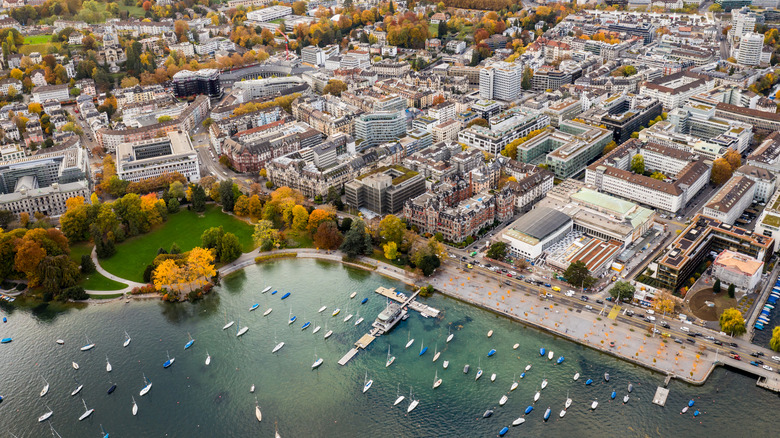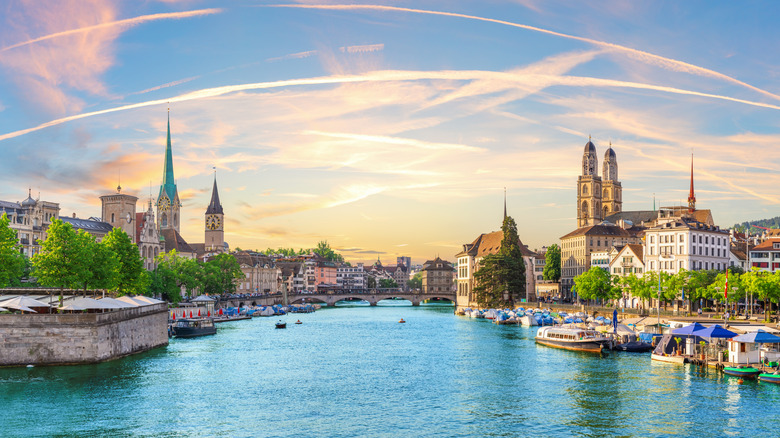This Picturesque European Destination Is Officially The World's Most Expensive City In 2025
Prices may seem like they are climbing everywhere, but in some cities, the pinch is particularly sharp. Urban life might be favored for its abundant culture, opportunities, and convenience, but it also carries a hefty price tag. In 2025, no city exemplifies this point more than Zurich, Switzerland's picturesque medieval city, which has officially been ranked as the world's most expensive city.
The latest Numbeo Cost of Living Index — a crowdsourced ranking that compares day-to-day expenses around the world — places Zurich at the top with a score of 112.5 points against New York's baseline of 100. That means everyday living expenses like groceries, healthcare, and transportation cost more in Zurich than almost anywhere else on earth. Even as locals feel the strain of price increases, Zurich's stable economy, high wages, and world-class services continue to attract locals and expats for the top-notch quality of life. Impressively, six Swiss cities dominate the global top ten: Zurich, Bern, Lugano, Lausanne, Basel, and Geneva, underscoring just how expensive life in Switzerland as a whole has become.
It's worth noting that this particular measurement doesn't take rent or mortgage payments into account. When factoring in housing costs, Zurich drops to the second most expensive city in the world, trailing behind New York. Among the top five most pricey destinations (including accommodation), three cities are Swiss, while two are located within the U.S. (New York and San Francisco). If we isolate rent as the only factor, Zurich slips down into ninth place worldwide, suggesting that while everyday living costs are above average, the city's rental market is relatively affordable compared with other cities at the top of the Cost of Living Index.
Why is Zurich so expensive, and what does it mean for locals?
Zurich's reputation as the world's most expensive city isn't without reason. A mix of limited housing supply, high transport costs, and pricey goods and services all drive up the cost of everyday living. Switzerland's relatively small domestic market means there are fewer purchasing options compared to neighbors, like France or Germany. On top of that, its mountainous geography makes importing goods costly, inflating prices even further. The country has a famously high quality of life, which means high taxes help maintain the efficient public transport networks, high-level education and healthcare, and clean streets. After all, Zurich is known for having some of the cleanest city air in the world.
Clearly, the high cost of living directly influences Zurich's premium lifestyle. Renting a one-bedroom apartment in Zurich averages CHF (Swiss franc) 1,650, while a family home can climb to CHF 3,500. For buyers, property in the city center hovers around $10,819 per square meter. Utilities and rates add another CHF 220 per month, while monthly transport costs are around CHF 98 — relatively affordable compared with London. Groceries, however, are especially steep. Locals spend upwards of CHF 450 per month, thanks to a small handful of supermarket chains dominating the market. And as one of the most expensive cities for dining out, meals out are even more costly.
Luckily, high salaries partly balance out these high costs. The average monthly salary for a Zurich local is around CHF 7,048. In fact, the country offers some of the world's highest-paying jobs, with some banking professionals bringing in as much as CHF 360,000 per year. A Deloitte consumer survey found that as prices surge with inflation, Swiss residents are cutting back on eating out, clothing, taking trips, and on leisure activities.

